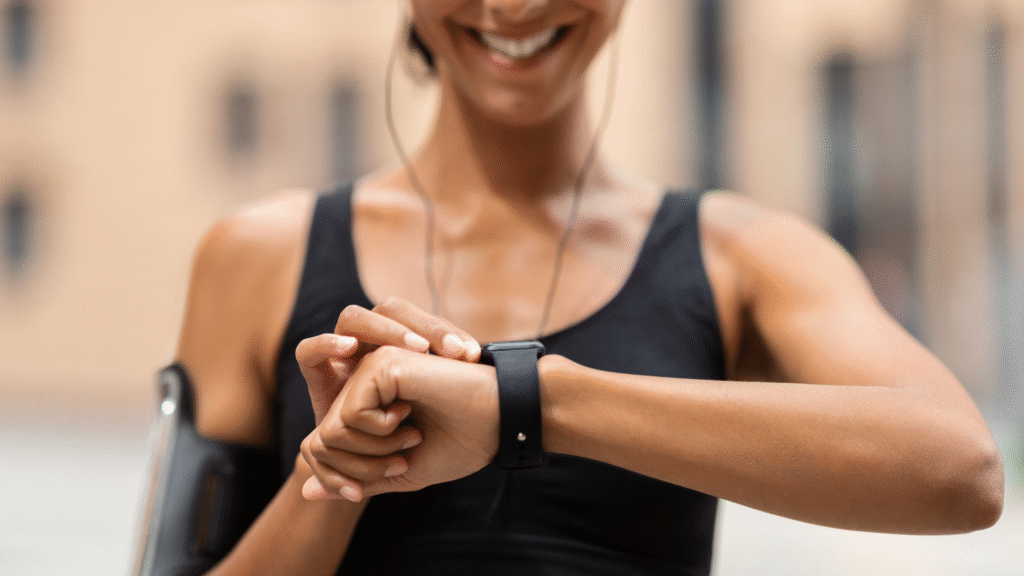Smartwatches and fitness bands are everywhere, promising to boost your workouts and health. From counting steps to tracking heart rate, these wearables claim to motivate you to move more. But do they actually make you fitter or faster? Let’s dive into the evidence and see how (and if) a tracker can help you perform better.
The Good: Motivation and Data
Wearing a fitness tracker often gives you a constant reminder of your goals. Studies consistently show that people who use activity trackers become more active than those who don’t. An umbrella review in Lancet Digital Health found that users of trackers took about 1,800 more steps per day on average – roughly an extra 40 minutes of walking. Over time, this added up: tracker users lost about 1 kg more weight and saw modest fitness gains compared to non-users.
In practical terms, seeing your daily step count or calories burned can nudge you to take the stairs instead of the elevator, or go for a short walk after dinner. Heart rate features can ensure you’re training in the right zone (see our Zone 2 vs. HIIT discussion). Sleep tracking can highlight if you’re not getting enough rest, prompting better sleep habits. All these data points create awareness – often the first step toward improvement.
The Limitations
However, a tracker is just a tool – not a magic bullet. Simply wearing one without behavioral changes doesn’t guarantee progress. Some pitfalls:
Accuracy Issues: Many consumer trackers are off by a few percent in measuring heart rate or distance. Don’t obsess over small discrepancies.
Overemphasis on Metrics: Focusing only on numbers can stress some people. Obsessing over steps or calories can detract from enjoying your workout.
Plateau Effect: Motivation from novelty can fade. After weeks or months, some users find their step counts plateau or they start ignoring the device.
Performance vs. Health: Trackers mostly encourage more movement and exercise, which is great for health. But if “performance” means running a faster 5K or lifting heavier weights, a tracker helps indirectly (by ensuring you train consistently) but doesn’t coach technique or plan workouts.
Choosing and Using a Tracker
If you decide to try a fitness wearable, think about what matters to you: steps, heart rate, GPS, or activity reminders. A great all-rounder like the Fitbit Charge 5 (an advanced fitness band) covers steps, heart rate, sleep, and has exercise modes. Many people recommend [Insert Amazon product link] Fitbit Charge 5 for its accuracy and user-friendly app. Other top choices include Garmin Forerunners or Apple Watches if you want more sports-specific features.
Key tips to actually improve performance with a tracker:
Set Achievable Goals: Use your tracker to set realistic daily/weekly targets (e.g., 8,000 steps a day, or a 30-minute workout). Adjust as you improve.
Sync Data & Review: Regularly check your app/dashboard. Look for trends – are you getting more active over time? Are your resting heart rate and sleep improving?
Use Reminders: Most trackers can vibrate to remind you to move if you’ve been sedentary. These small prompts can prevent long periods of inactivity.
Stay Critical: Don’t fear missing a workout. If you miss your goal one day, rebound the next day. The goal is consistency, not perfection.
Combine with Real Coaching: A tracker is best used alongside a training plan or coach. Use the data it provides to inform how hard you train or rest.
Do They Improve Performance?
Wearable trackers can improve your overall activity levels and health over time. The science says yes – users move more and (moderately) more than those who don’t wear trackers. This generally leads to better fitness and smaller waists. That said, for peak athletic performance, trackers are just one piece of the puzzle. They won’t replace good training habits, technique work, or nutrition.
If you’re motivated by data and like gadgets, a fitness tracker is a powerful motivator. It shines by giving you immediate feedback and small daily targets. On the other hand, if you’re already highly disciplined, a tracker might offer only incremental gains.












